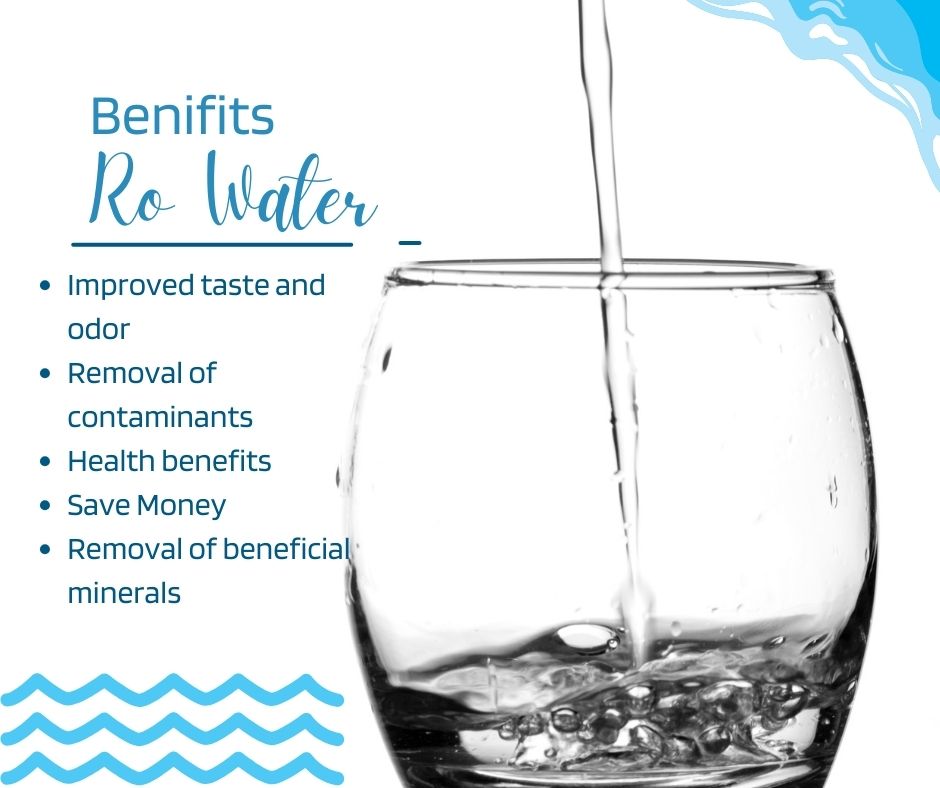
Introduction:-
Clean and safe drinking water is essential for maintaining good health. As more people become aware of the potential contaminants present in tap water, the demand for effective water treatment systems has increased. One such system is Reverse Osmosis (RO), which has gained popularity for its ability to provide clean and purified water. In this comprehensive guide, we will explore the benefits of RO water and why it is worth considering for your household.In This topic we will talk about Unlocking the Benefits of RO Water: A Comprehensive Guide.
Understanding Reverse Osmosis (RO)
Reverse Osmosis (RO) is a water treatment process that removes impurities from water by utilizing pressure to force water molecules through a semipermeable membrane. This process effectively removes contaminants such as bacteria, viruses, chemicals, and dissolved solids, leaving behind clean and pure drinking water.
A typical reverse osmosis system consists of several key components, including a sediment filter, a carbon filter, a reverse osmosis membrane, a storage tank, and a post-filter. Each component plays a vital role in the proper functioning of the system and ensures the highest quality of water output.
Advantages of RO Water
Improved Taste and Odor
One of the significant benefits of RO water is its improved taste and odor. The reverse osmosis process effectively eliminates chlorine, which is commonly used as a disinfectant in municipal water supplies. As a result, the water tastes and smells fresher, making it more enjoyable to drink and use in various daily activities.
Removal of Contaminants
RO water is known for its ability to remove a wide range of contaminants. The semipermeable membrane used in the RO process effectively filters out bacteria, viruses, heavy metals, pesticides, nitrates, and many other harmful substances. By removing these impurities, RO water provides a safer and healthier drinking option for you and your family.
Health Benefits
Consuming clean and pure water has numerous health benefits. The removal of contaminants through the RO process helps reduce the risk of waterborne diseases and potential long-term health issues associated with chemical exposure. Additionally, RO water is free from potentially harmful elements such as lead, arsenic, and fluoride, making it a preferred choice for individuals concerned about their well-being.
Disadvantages of RO Water
While RO water offers several advantages, it is essential to consider its disadvantages as well.
Wastage of Water
The reverse osmosis process produces pure water but also generates a significant amount of wastewater. For every gallon of RO water produced, there can be a wastage of anywhere from two to four gallons of water. This wastage can pose environmental concerns and may not be ideal in regions facing water scarcity.
Removal of Beneficial Minerals
In addition to removing contaminants, RO water can also eliminate essential minerals present in water, such as calcium, magnesium, and potassium. While these minerals are not solely obtained from water, their removal may have some impact on your overall mineral intake. However, a well-balanced diet can easily compensate for any potential deficiencies.
Cost Implications
RO systems require filters and membranes replacements periodically, which adds to the overall cost of ownership. The initial investment and regular maintenance can be relatively expensive compared to other water treatment options. It is crucial to consider the cost implications and weigh them against the long-term health benefits before making a decision.
RO Water and Environmental Impact
Despite its environmental concerns, reverse osmosis can help address certain water-related challenges, such as the availability of clean drinking water. It serves as an effective method in areas where the water supply is heavily contaminated, offering a reliable source of clean drinking water. However, it is essential to strike a balance between the benefits of RO water and its potential environmental impact, particularly in regions already facing water scarcity. Water conservation and responsible RO system usage can help mitigate these concerns.Unlocking the Benefits of RO Water: A Comprehensive Guide
RO Water vs. Other Water Treatment Methods
When evaluating the suitability of RO water for your needs, it is essential to compare it with other popular water treatment methods. While all methods aim to provide clean water, RO water stands out in several ways. It offers superior filtration capabilities compared to activated carbon filters, which are commonly used in pitcher filters or faucet attachments. RO water also performs better in removing contaminants compared to ultraviolet (UV) purification methods. By understanding these differences, you can make an informed choice when selecting a water treatment system.
Maintaining and Caring for Your RO System
To ensure the longevity and efficiency of your RO system, proper maintenance is crucial. Here are some tips to help you maintain and care for your reverse osmosis system:
- Regularly change filters and membranes according to the manufacturer’s instructions.
- Sanitize the system periodically to prevent bacterial growth.
- Check for leaks and address them promptly to avoid any potential damage.
- Keep the system and surrounding area clean and free from debris.
- Regularly monitor the water pressure and adjust if necessary.
By following these maintenance tips, you can maximize the lifespan and performance of your RO system.
Tips for Choosing the Right RO Water System
When selecting an RO water system for your specific needs, consider the following factors:
- Water Quality: Assess the quality of your water and identify the contaminants you wish to remove.
- System Capacity: Determine the amount of purified water you require on a daily basis.
- Installation Space: Consider the available space in your kitchen or utility area for the system installation.
- Budget: Set a budget that includes both the initial purchase cost and ongoing maintenance expenses.
- Certification: Look for certifications such as NSF/ANSI standards to ensure the system meets quality and safety requirements.
Understanding these factors will help you choose an RO water system that best suits your needs and preferences.
Conclusion
In conclusion, unlocking the benefits of RO water involves understanding its advantages, disadvantages, and its potential impact on the environment. RO water provides improved taste, removes contaminants, and offers various health benefits. However, it also wastes water, removes beneficial minerals, and may have cost implications. By considering these aspects and maintaining an RO system adequately, you can enjoy clean and purified water in your home. Remember, choosing the right RO system and adhering to responsible water usage practices are key to unlocking the true potential of RO water.

